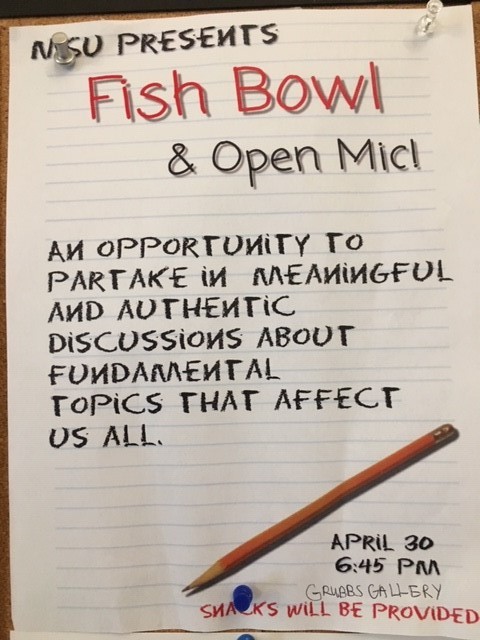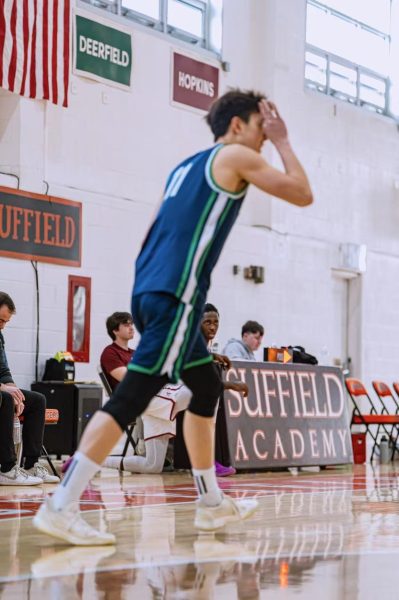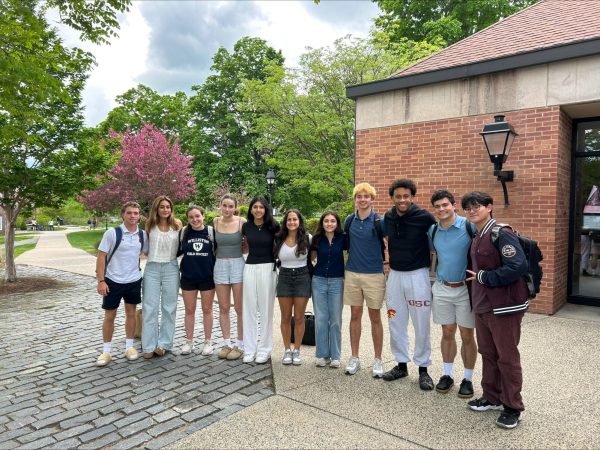MSU “Fish Bowl” Addresses Race, Culture, Ethnicity
On April 30, the Multicultural Student Union (MSU) hosted a Fish Bowl Discussion & Open Mic Night featuring students and teachers diving into issues of race and culture, items people typically don’t feel comfortable discussing in an open forum.
This was the first time the MSU has hosted an Open Mic Night. It was an opportunity for people to understand each other in a safe and judgment-free zone.
In the open-mic portion of the event, featured performances included Nat Simpson, Language Teacher, Anaya Akapalu ’21, and Insoo Kang ’19.
Simpson read two poems, both in Spanish and English, by Pablo Neruda. The first poem he read was about Neruda talking about the country he left behind, expressing immense nationalism. The second poem was called “I like you when you’re quiet,” which is about love. Neruda was a Pulitzer-Prize winning poet from Chile.
Anaya read an emotional piece she wrote named “Ode to Survivors.” Insoo, from Korea, talked about the Asian stereotypes he had to face in sports. He pushed away the label of him not being able to play basketball because he is Asian. “Labels can really pull people down,” he told the audience.
Before each question, volunteers went up to the front of the room and sat in chairs, the spotlight squarely on them. Then Zoe Okaisabor ’19, leader of the MSU, picked from a bowl with questions written by students and members of the audience. If the volunteers chose to not answer, they were allowed to tap out. Someone could take their place and answer the question for them instead.
The questions centered on divisive issues including politics, culture, race, ethnicity, and stereotypes.
Students confronted subjects such as: “Does talking about race divide us?”, “What constitutes cultural appropriation?”, and “What are some thoughts on the repeat of the use of the ‘n word’ in pop culture?”
Some student answers included describing the fine line between cultural appropriation and cultural appreciation, and the importance of education. The phrase, “My culture is not your costume” popped up as an example of appropriation, the adoption of one culture’s customs by another, typically more dominant, one.
The term microaggression came up as well; students described their experiences dealing with subtle forms of racism or prejudice while others listened attentively.
“We [MSU] are all about starting and continuing to support conversations about everyday topics in our lives,” Kassandra Ocrutt ’19, one of the MSU leaders, told The Willistonian. “We think that as students and athletes, we are not given enough debriefing time. So we wanted to create an event that allowed students to ask questions without guilt or embarrassment.”
Zoe felt the event went even better than she’d hoped.
“Because it is our first time doing something like this, surprisingly, it was a lot better than I expected” she said. “A lot of people really had good conversations and there were different opinions, which I wasn’t expecting at all.”
Zoe added, “I think something that we can work on for next time is putting a time cap on things. I didn’t really expect people to talk so much for the first time.”
Erin is a senior from Taipei, Taiwan. She enjoys playing volleyball and watching "The Bachelor" during her free time.













